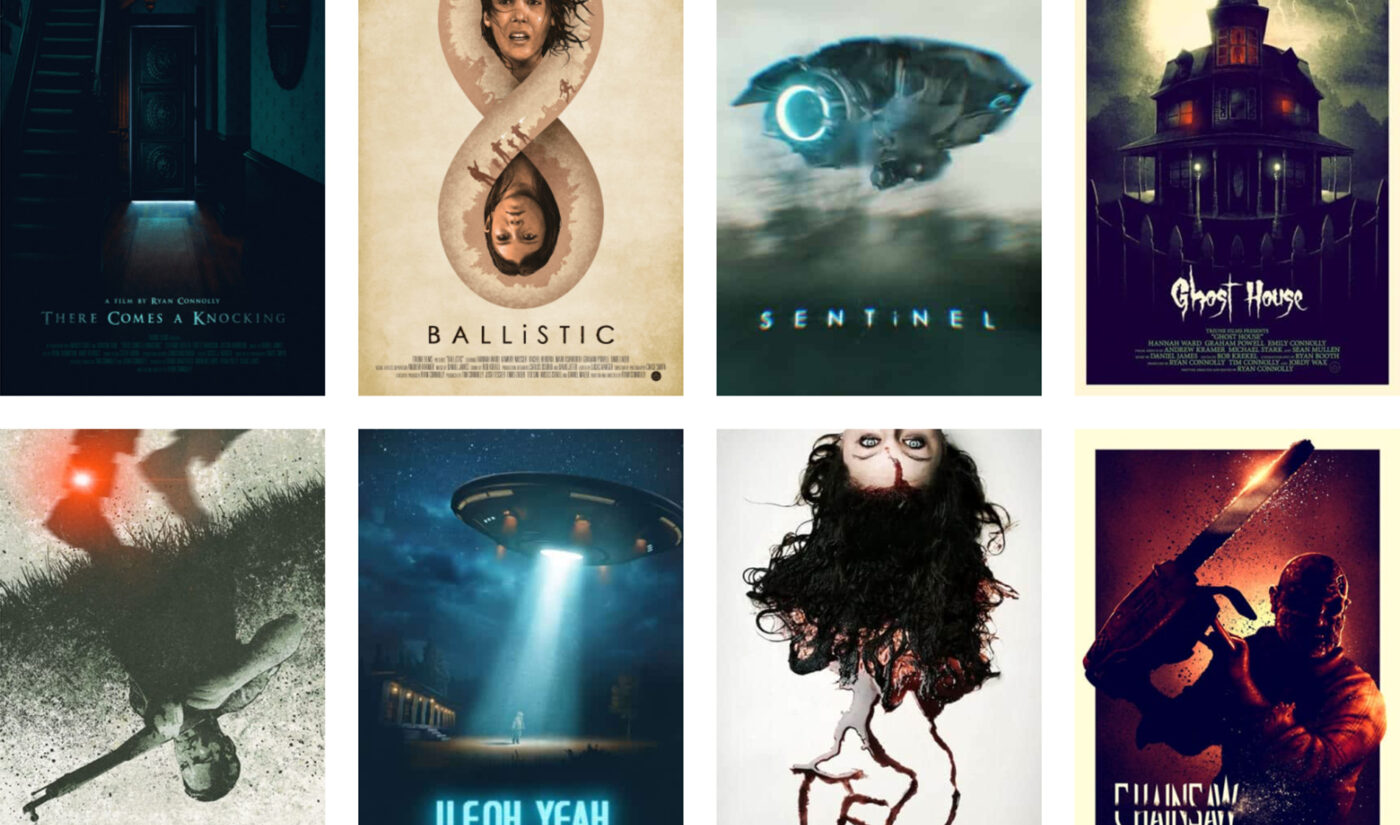Welcome to YouTube Millionaires, where we profile channels that have recently crossed the one million subscriber mark. There are channels crossing this threshold every week, and each creator has a story to tell about YouTube success. Read previous installments here.
This week’s installment of YouTube Millionaires is brought to you by Bright – a learning platform focused on real conversations that level up your life.
Imagine you don’t know how to solve 1+1.

Subscribe for daily Tubefilter Top Stories
Imagine you want to learn.
Imagine you scour the internet, the library, every possible repository of information you can think of, looking for help. Now imagine that in all these places, every resource you find begins not with simple addition, but with complex, unfathomable calculus.
Imagine this, and you might understand how Ryan Connolly felt as a teenager trying to find his way into filmmaking. He wanted to learn the basics, the foundations. But this was back before digital video platforms were a thing, so his only access to instruction was books–and they didn’t start with the basics. They were filled with lexicon he didn’t know, and touted techniques that were difficult to visualize from paper to film.
Connolly did end up finding his way into the industry–but he had to go to film school to do it. And once he’d graduated, the barrier to entry for beginners was even more apparent. He’d been able to attend film school, but there were millions of people who couldn’t. He knew there were countless aspiring filmmakers who were struggling, like he had struggled, to grasp the fundamentals of being behind the camera when no one was willing to teach them.
So, he went on YouTube and launched Film Riot.
Part film school, part self-assigned crash course, part documentary, Film Riot is a 12-year-old project that follows Connolly’s entire journey as a postgrad filmmaker. In each episode, he dissects film techniques, learns them, tests them, and teaches them, sharing his findings and successes and missteps with viewers. Over the years, he’s discussed everything from threading together plot structures to pulling off complicated visual effects, and has also debuted 15 short fims that put his knowledge to action.
These days, Film Riot is a massive, 1,200-video trove of knowledge about filmmaking–one Connolly hopes can be the kind of resource he needed when he was a teenager, and all he wanted to do was learn.
Check out our chat with him below.
This interview has been edited for length and clarity.
Tubefilter: How does it feel to hit one million subscribers?
Ryan Connolly: It was awesome. That was a huge milestone for us and one that took a long time to get there. There’s a lot of channels that have a meteoric rise, but that wasn’t really us, you know? I don’t know the exact number of years it took, but it was definitely over eight years to really get us there.
We’re a show that’s been going on for 12 years now, so getting to that point felt like this great sort of shot of adrenaline to what we’re doing. In the way that shows like this are made, you can get a little winded, so it was just a really great. A victory lap moment for us, for sure.
Tubefilter: What do you have to say to your fans?
RC: When we hit one million, we did an episode just thanking our community. We never say “fans,” we say community, because that’s what I really feel like we’ve been able to build. This is not a group of fans that watch the show, but a filmmaking community that we are lucky enough to exist with, and sometimes be the sort of center of gravity for, I suppose. It’s all of them that got us here, so it’s nothing but intense gratitude from us, because it’s that community and those people clicking that button and sticking with us that has been able to let us do all the things we’ve been able to do over the past 12 years.
Tubefilter: What made you decide to start Film Riot way back in 2006?
RC: In the early days, it was just a show I was making inside of my bedroom. I was essentially just not sleeping two days a week to get it done, because I had a full-time job at the time as well.
The reason I [started it] is because the ultimate goal for me is to be a filmmaker, to make feature films. That’s what the show has been tracking all this time. From back then, in the beginning, I’ve always tried to be objective of where I was at as a filmmaker. I’d gone to film school, I was in the professional world for a few years, but I still knew how much I needed to learn. And a friend of mine was frustrated because back then, you know, 2008, 2009, there wasn’t really anything informational like this for overall filmmaking, something that could be digested by people just starting out.
There was a barrier to entry there. There wasn’t anything that just started with one plus one equals two. Everything was just straight-up algebra off the bat. So I had to go to film school because of that, and at the time, I was like, “Man, how cool would it be if I was able to put this information out there?” but also do in such a way that was not, you know, “Hey I’m Professor Ryan.”
Tubefilter: What were your goals with the starting the show?
RC: In the early days, if you go watch our first few years of episodes, the opening bumper of the show was me saying, “You want to be a filmmaker? So do I. Let’s figure it out.” That has always been the motto of the show. It is to this day.
I’m pitching out in Hollywood now, and feature film seems to be on the horizon. But to this day we, we put that out, because we learn with every brand-new thing you do. Even moreso back then. So it was very much the idea of like, what if there was this show where I was able to put out this thing for the 15-year-old version of me and be like, “Hey, here’s stuff that you can’t really find anywhere else, that’s really going to give you a leg up. But also, you know, I don’t know either, and I’m just figuring it out.”
The channel also also gave us a platform to make short films and put them out to someone, instead of just making a short film and no one was going to watch it.
Tubefilter: What challenges did you run into?
RC: One thing that I didn’t calculate was that it would force me to stretch myself and learn at an extremely rapid pace, because every week, I had to come up with a new thing to try and then learn how to do it, test it, and then teach it. I’ve always said it was like learning how to play the guitar by starting with the acoustic first and then going to the electric. By the time I went to the electric, I was like, “Oh wow, this is really easy.”
By the time I got a crew and could slow down and actually focus, it ended up being this great thing where we’re able to be open and honest throughout the course of the show and show where we’re at, what we’re doing, and what we’re learning. So again, not being your professor, like, “Here’s how you make a film,” but being, “Here’s what I know. Here’s what I just messed up on. Here’s what I think I did well.” That’s kinda been the heart of it.
I think the best is example is we were going to do short film in 2013, and it would have been, to this day, the biggest project we had ever done it. A $350,000 short film would have been about 30 minutes long. It was going to be a hundred-person zombie makeup day, practical explosions. We had people that worked on Transformers building sets for us.
And at the last minute, half of the financing fell through. It was on a Friday that we got the, “This isn’t happening.” On Monday, we were supposed to be rolling cameras. We had to call everybody, shut things down. Some people were already on planes, on their way here, and there was nothing we could do about it.
So we took that opportunity, and instead of hiding it, we were just very public about it. We were like, “This is what happened. We screwed up, the financing fell through, and now we’re not making the film.”
But then we took that and practiced what we preach. I would always say on the show, “You come up against a bigger wall, you get a bigger sledgehammer.” And so, at that time, we were like, “We’re going to make a short film. Maybe we don’t have $350,000 anymore, but I do have $300 and least few people who are willing to be in it for free, and this empty plot of land.”
So in 10 days we came up with and shot a short film, which is still one of my favorite short films that we’ve ever made. That, I think, is a really good, distilled version of what the show has always been about. You reach for as high as you can, and that’s rarely going to happen. There’s some lucky few where what they reach for reaches back, but for everybody else, the 99% of us, it’s just are you going to be defeated or are you going to go out there and make it anyway?
Tubefilter: You mentioned that you’re moving away from the channel a bit and focusing on pitching in Hollywood. Is your brother, Josh, handling a lot of the channel’s day-to-day now?
RC: Yeah, that’s pretty much the idea. I’ll never leave the channel–I’m trying my own films with my company, but Film Riot is my baby, I could never leave it. But Josh is taking over more and more as the main producer and an editor on the show with all the main hosts, and some of the day-to-day things that I usually do, I’m backing more away from to free up time to go over and develop feature films.
It’s interesting because Josh is having a similar path to me. He wants to direct, so now he’s starting to take things over, and his sensibilities are starting to seep into the show. You’re going to see another filmmaker coming up in that way.
We want to try to do that more with different voices, bringing different voices in, and use it like a sort of conveyor belt for people to come in, try stuff, let the audience learn along with you, and then go off into your stuff. But I’m not going anywhere, and I am gonna continue to be the creative lead of the show and host of the show.
Tubefilter: When did Josh join the channel?
RC: He joined right away as an actor. He was about 17, and in the beginning, I got the show started and then it was like, I knew he could be in front of the camera and I knew he was funny.
So I was like, “Hey, come do this.” And he was funnier than I thought he even was. And then slowly but surely he just started really loving it, and it was really just acting for him that he loved. But then slowly he started enjoying being behind the camera a little bit and then developing that. And over the years, I just mentored him more and more, and he became an amazing filmmaker in his own right. So it’s kind of like Film Riot has been his public film school.
Tubefilter: How do you split your time managing so much on the channel and with your feature film work?
RC: It’s definitely tough. I have two kids and a wife, so I want to make time for my family. That’s something that we preach on the show, too–trying to find that balance. I’ve been really horrible with that over the years. And most filmmakers, I know, we become intensely obsessed, and we just do 24/7. And for a long period of time, I was getting it seven days a week, 15 to 18 hours a day.
And that started to take a toll on my health, and when my wife got pregnant, she told me, “When you’re 80, you’re not going to look back and be glad for the movies you make, you’re going to look back and regret the time expense of your family.” And that completely reshaped everything for me. So I’ve been trying to live by that and find more balance with work and with home life.
As far as work goes, I have a company that I run along with my older brother, Tim. It’s very much a family business; some of my sisters are involved in the company as well.
Since it’s been 12 years, we do have a bit of a solid structure in place: we know how many pages we need written, how long this is going to take us…So there is like a tremendous shorthand there that really helps us out quite a bit. But there’s still plenty of nights with the give and take to be able to have that family time. Once my wife and kids go to bed, I just go back to work, and I’m writing the script for tomorrow and things like that. And then it’s just finding the time for that feature stuff.
I don’t have a great answer for this, because it’s kind of just been trying to figure it out week by week, day by day, just depending on how crazy busy one thing or the other is.
Tubefilter: How do you pick which films and TV series to formulate videos around? Do you only pick “good” works to show?
RC: It’s techniques and concepts more than anything else. I’ll use some films as a reference, but it’s always something that spoke to me in one way or another, personally. Creativity is so subjective, and there’s so many things online that try to peg creativity into objectivity. And that’s not a thing, you know? What you might think is the greatest movie alive, I might not like at all. And the movie that I like is your favorite movie.
So we keep that in mind and try not to diminish voices, to diminish how someone might see something, but instead show the concepts of why something is the way it is, why it’s working for me. And then you can go and look at the thing that’s working for you and find out why it’s working for you. For us, everything’s approached in that way. So if I’m breaking down the structure of something like The Ring, or Annihilation, we talked about recently, it’s because those films really spoke to me in one way or another.
Tubefilter: What’s next for you? Any plans looking to the future?
RC: We’re just trying to build it out more and more. We want to do more content on the channel. Right now, we’re at a consistent four episodes a month. We would love to get that to six or eight. We would like to get more of a behind-the-scenes of our day-to-day, showing what we’re doing and why we do it. Building out our store more with more assets, more educational content.
We’re doing some stuff on our site to try to connect with our community a lot more and have a lot more engagement there, maybe with exclusive content.
And all the while, on my side, I’m pushing toward those feature films. So hopefully that’s where we’ll sort of head, and the audience will be able to come along on that kind of grand scope of a journey. That’s really where we’re headed. Maybe original scripted narrative for the channel, and in the future we can share the behind-the-scenes of that as we make it as well– in-depth behind-the-scenes of how and why we did it. That’s definitely a goal.
 This week’s installment of YouTube Millionaires is brought to you by Bright – a learning platform focused on real conversations that level up your life.
This week’s installment of YouTube Millionaires is brought to you by Bright – a learning platform focused on real conversations that level up your life.
On Bright, participants receive unprecedented access to learn from their favorite creators, icons and experts within an intimate, live video chat setting. More than 1500 talent are on the waitlist to lead Bright Sessions for audiences looking to improve their lives. Fans come face-to-face with their favorite talent, ask questions and are able to make requests from the VIP area while joining talent on the Bright Stage for direct exchanges and personal learning among other Bright interactive features.
For more info and to experience conversations that level up your life, head over to Brightlive.com.








